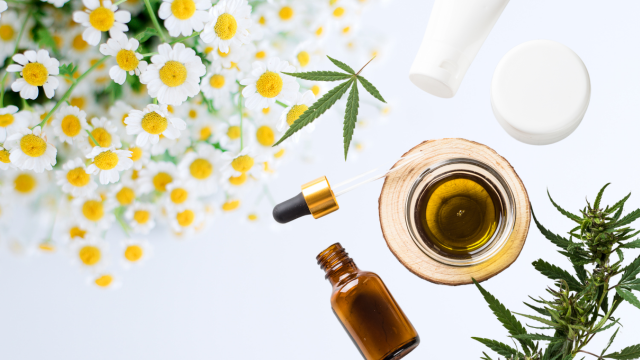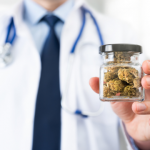Are you at least 21 years of age or hold a valid medical marijuana card?
Daily Specials
{{ special.title }}
{{ special.description }}
*{{ note }}EARTHMED BLOG

Let’s Talk Terpenes: Bisabolol

In the latest addition to our “Let’s Talk Terpenes” series, we feature the sweet, floral terpene bisabolo. Let’s talk about it!
If you're interested in cannabis, essential oils, or skincare, you've probably come across the term "Bisabolol." But what is bisabolol, how do you pronounce it, and what are the bisabolol terpene effects? Let’s dive into everything you need to know about this fascinating compound.
What is Bisabolol?
Bisabolol is a naturally occurring terpene found in various plants, most notably in chamomile and the Brazilian candeia tree. Terpenes, in general, are aromatic compounds responsible for the unique scents of plants, and they play a significant role in both aromatherapy and the cannabis experience. Bisabolol is famous for its sweet, floral aroma, reminiscent of chamomile, which is why it’s a popular ingredient in cosmetics and skincare products.
Not only does bisabolol smell great, but it’s also packed with potential health benefits, making it popular in wellness circles. This terpene has anti-inflammatory, antioxidant, and antimicrobial properties, and has been used for centuries in herbal remedies for its soothing effects.
How to Pronounce Bisabolol
Let’s address the elephant in the room. Bisabolol is tricky to pronounce, and there's no universal agreement on the right way to say it. Generally, you’ll hear two primary pronunciations:
- bih-SAB-uh-lol
- bee-SAH-buh-lol
Both pronunciations are widely accepted, so don’t stress which one to use. In casual conversation, either works fine, and no one will likely correct you. It’s one of those words that even experts aren’t entirely aligned on!
Is Bisabolol Safe?
Yes, bisabolol is considered safe for most people, and it’s commonly used in cosmetics, skincare, and even some food products. The FDA lists bisabolol as a "Generally Recognized As Safe" (GRAS) compound, and it’s well-tolerated by most people, even those with sensitive skin.
Its soothing properties make it a frequent addition to creams, lotions, and other topical products that reduce inflammation and irritation. Due to its anti-inflammatory effects, there’s also ongoing research into its potential role in treating various skin conditions, such as acne and eczema.
However, as with any compound, there is a chance of allergic reactions to bisabolol terpene effects in a small number of people. If you have sensitive skin or known allergies to chamomile, patch-test products containing bisabolol before using them.
Cannabis Strains High in Bisabolol
Though more commonly associated with chamomile, bisabolol can also be found in certain cannabis strains. The presence of bisabolol in cannabis can contribute to the plant's flavor profile and enhance its calming effects. Here are a few strains known to be high in bisabolol:
- Harle-Tsu: This CBD-rich strain is a favorite for those seeking relaxation and pain relief without the psychoactive effects of THC.
- AC/DC: Another high-CBD strain, AC/DC is popular among medical cannabis users for its mellowing effects and bisabolol's contribution to its anti-inflammatory properties.
- Pink Kush: With its sweet and floral aroma, Pink Kush is high in bisabolol and a favorite for those seeking relaxation and stress relief.
These strains are often chosen by people looking for the soothing effects of bisabolol, especially for those managing stress, anxiety, or inflammation.
The Effects of the Bisabolol Terpene
When it comes to bisabolol terpene effects, the benefits are impressive. Its medicinal properties have made it a star in both the skincare and cannabis worlds. Here's a closer look at some of its key effects:
1. Anti-Inflammatory: Bisabolol is known for its potent anti-inflammatory properties. In skincare, it helps reduce redness and irritation. In cannabis, this translates to potential relief from inflammation-related issues, such as arthritis or muscle pain.
2. Antioxidant: This terpene is also an antioxidant, which means it helps fight free radicals that can damage cells and accelerate aging. It’s one of the reasons bisabolol is popular in anti-aging skincare formulations.
3. Antimicrobial: Studies suggest that bisabolol has antimicrobial effects, making it helpful in fighting bacteria and fungi. This property makes it a common ingredient in products that prevent or treat infections.
4. Soothing and Calming: Bisabolol is deeply calming, as seen in chamomile teas and topical products that promote relaxation. In cannabis, this translates to a more relaxing and sedative experience, especially when paired with other soothing terpenes like linalool.
5. Skin Healing: Because of its soothing and antimicrobial properties, bisabolol is used in products that help treat burns, wounds, and other skin irritations. This makes it especially useful for those with sensitive skin or those recovering from skin damage.
Bisabolol may be a mouthful to pronounce, but its benefits make it a terpene worth knowing. Whether you’re enjoying it in your favorite chamomile tea, using a skincare product with this soothing ingredient, or consuming a cannabis strain high in bisabolol, this terpene offers a variety of positive effects.
Do you search for strains high in bisabolol? Hit me up on social media, and let’s spark up a conversation about it.
{{ locations[0].name }}
{{ locations[0].address }}{{ locations[0].city }}, {{ locations[0].state }} {{ locations[0].zip }}
{{ locations[0].phone }}
Hours
Sun: {{ locations[0].hours_recreational.Sunday }}Mon: {{ locations[0].hours_recreational.Monday }}
Tue: {{ locations[0].hours_recreational.Tuesday }}
Wed: {{ locations[0].hours_recreational.Wednesday }}
Thu: {{ locations[0].hours_recreational.Thursday }}
Fri: {{ locations[0].hours_recreational.Friday }}
Sat: {{ locations[0].hours_recreational.Saturday }}
{{ locations[1].name }}
{{ locations[1].address }}{{ locations[1].city }}, {{ locations[1].state }} {{ locations[1].zip }}
{{ locations[1].phone }}
Hours
Sun: {{ locations[1].hours_recreational.Sunday }}Mon: {{ locations[1].hours_recreational.Monday }}
Tue: {{ locations[1].hours_recreational.Tuesday }}
Wed: {{ locations[1].hours_recreational.Wednesday }}
Thu: {{ locations[1].hours_recreational.Thursday }}
Fri: {{ locations[1].hours_recreational.Friday }}
Sat: {{ locations[1].hours_recreational.Saturday }}






